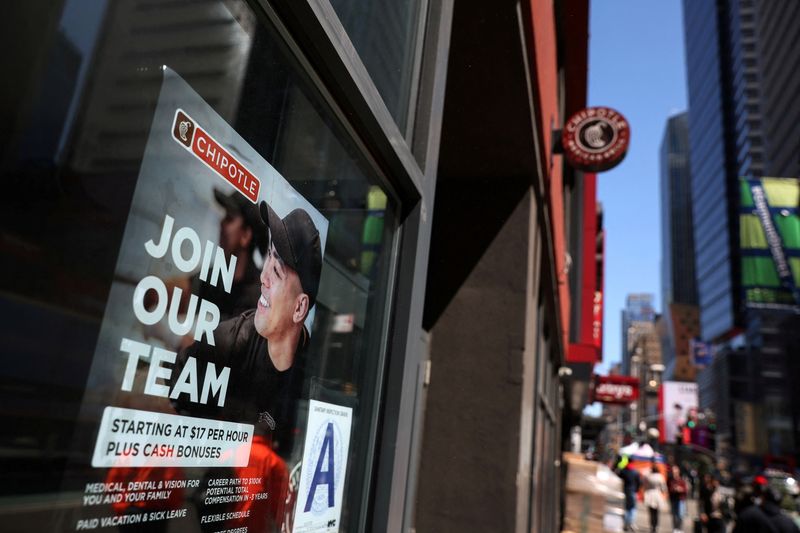By Lucia Mutikani
WASHINGTON (Reuters) - The U.S. services industry unexpectedly picked up in July as new orders grew solidly, supporting views that the economy was not in recession despite output slumping in the first half.
The Institute for Supply Management (ISM) survey on Wednesday also showed supply bottlenecks were easing while a measure of prices paid by businesses dropped by the most since 2017, benefiting in part from declining commodity prices. But shortages of labor, especially truck drivers, persisted.
"The recovery's best days are clearly in the rear-view mirror, but this doesn't mean a downturn has begun," said Oren Klachkin, lead U.S. economist at Oxford Economics in New York. "Fundamentals are strong enough to prevent a recession this year, though the window to achieving a softish landing is narrowing."
The ISM's non-manufacturing PMI rebounded to a reading of 56.7 last month from 55.3 in June, ending three straight monthly declines. Thirteen industries, including mining, public administration and wholesale trade reported growth. But agriculture, forestry, fishing and hunting, as well as retail trade and finance and insurance contracted.
Economists polled by Reuters had forecast the non-manufacturing PMI decreasing to 53.5. A reading above 50 indicates expansion in the services sector, which accounts for more than two-thirds of U.S. economic activity.
The surprise rebound followed the ISM's manufacturing survey on Monday showing factory activity slowing moderately last month. It was in stark contrast with the S&P Global (NYSE:SPGI) survey showing the services sector shrinking in July.
The government reported last week that the economy contracted 1.3% in the January-June period.
Wild swings in inventories and the trade deficit tied to snarled global supply chains have been largely to blame. Overall economic momentum has, however, cooled as the Federal Reserve aggressively tightens monetary policy to fight inflation.
"The ISM activity is consistent with GDP growth of close to 2% annualized, rather than the outright declines seen over the first half of the year," said Michael Pearce, senior U.S. economist at Capital Economics in New York. "With borrowing costs down from their June peak, and falling gasoline prices likely to feed through to rising real disposable incomes, the immediate outlook for services is looking a little brighter."
National average gasoline prices have dropped from above $5 per gallon in July to $4.16 on Wednesday, according to AAA.
Stocks on Wall Street were trading higher. The dollar rose against a basket of currencies. Most U.S. Treasury yields climbed to two-week highs.
WEAK SPOTS EMERGING
The ISM's measure of new orders received by services businesses shot up to 59.9 from 55.6 in June. Businesses reported a rise in exports.
Services activity is being supported by a shift in spending from goods. But signs of weakness are mounting.
Accommodation and food services businesses reported that "restaurant sales have softened the past few weeks." Businesses in the management of companies and support services sector said they "can feel the economy weakening," and that "clients are making appropriate moves in anticipation of a recession."
Retailers said they were "in inventory reduction mode, attempting to match inventory levels to current lower sales trends." In the public administration sector, there was "pressure of a job market shortage for qualified workers to increase wages and other benefits."
The ISM's services industry employment gauge improved to 49.1 from 47.4 in June, which was the lowest reading since July 2020. Though demand for workers in industries like construction, wholesale and retail trade is easing, labor remains in short supply. According to the survey, companies reported "employee turnover, backfills taking longer to locate and onboard."
Businesses also said they were experiencing "difficulties hiring new candidates as we lose more people who retire or leave the company for new opportunities."
The government reported on Tuesday that there were 10.7 million job openings at the end of June, with 1.8 openings for every unemployed person.
The survey's measure of supplier deliveries fell to 58.3 from 61.9 in June, helping to slow the pace of increase in services inflation. A reading above 50 indicates slower deliveries. Backlog orders were also reduced.
Goods like appliances, computer hardware, electrical components, paper products as well as needles and syringes remained in short supply.

A gauge of prices paid by services industries for inputs declined to 72.3, the lowest reading since February 2021, from 80.1 in June. The 7.8 percentage points drop was largest since May 2017. This, together with a moderation in prices at the factory gate in July, suggests that inflation has probably peaked.
"The recent easing in prices may in part be due to the move lower in commodity prices, but nonetheless this broad easing of price pressure will be welcome news for policymakers tasked with quelling inflation," said Shannon Seery, an economist at Wells Fargo (NYSE:WFC) in New York.
